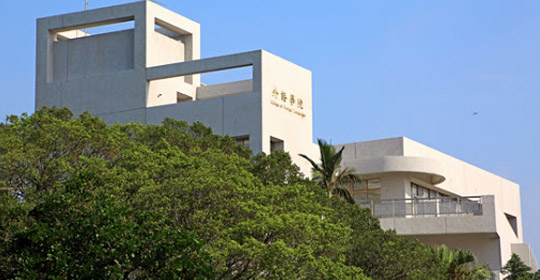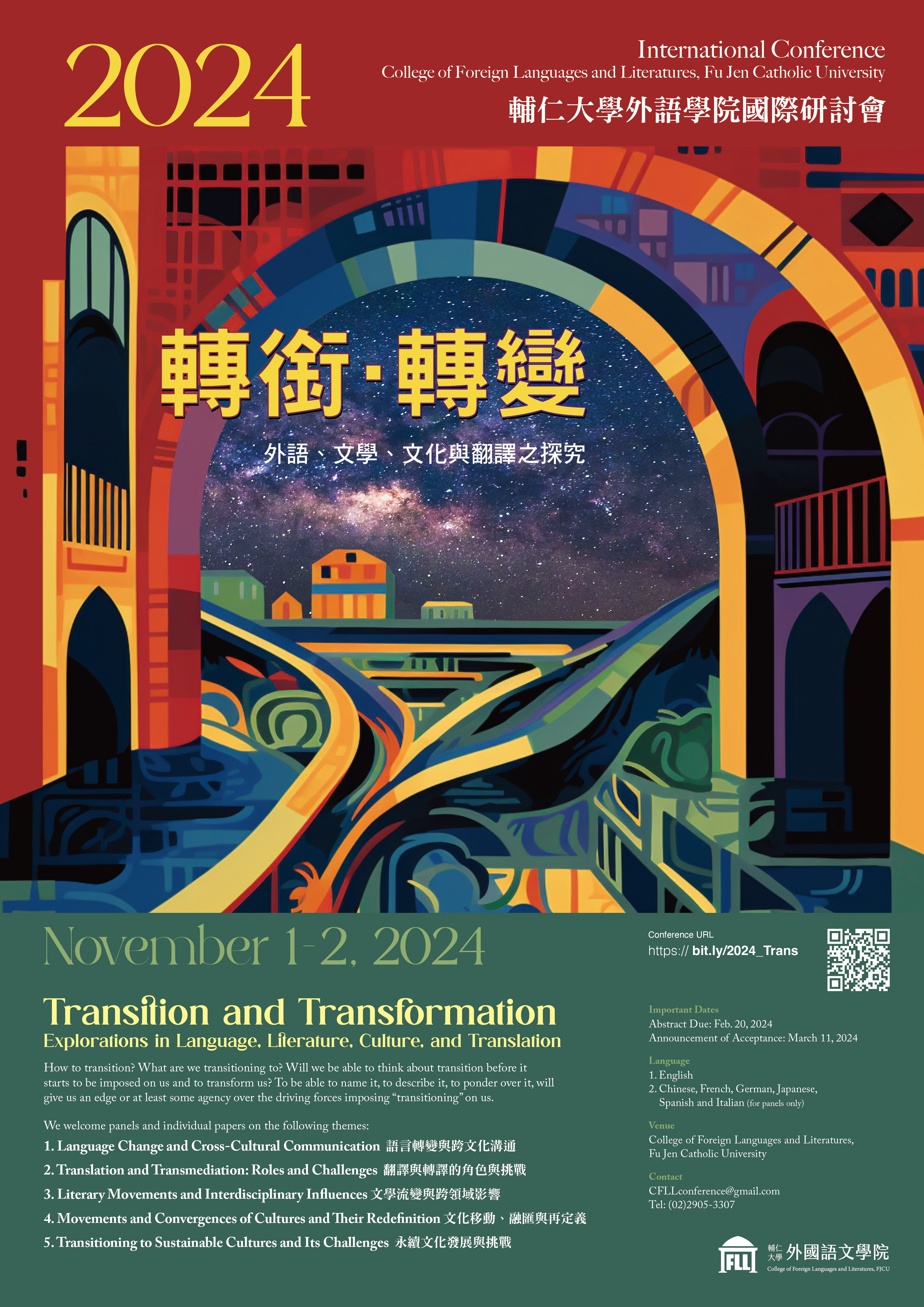College of Foreign Languages and Literatures, Fu Jen Catholic University
2024 International Conference
Transition and Transformation: Explorations in Language, Literature, Culture, and Translation
轉銜・轉變:外語、文學、文化與翻譯之探究
Date: November 1-2, 2024 Conference Website
Venue: College of Foreign Languages and Literatures, Fu Jen Catholic University
|
The driving forces affecting the world in unpredictable and irreversible ways are so pervasive, ubiquitous, and intricate that "the world as we know it" is on the verge of becoming unrecognizable. Factors of disruption are already so numerous that naming them all is impossible: climate change, biodiversity loss, scarcity of energy resources, global geopolitical disorder, artificial intelligence, and animal cloning, to state the most obvious. Our economic, energetic, geopolitical, cognitive, aesthetic, and educational futures seem to have opened to endless possibilities of redefinition. The multifactorial nature of the changes transforming reality leads us to face an urge to adapt from everything we were and had to anything we might still become.
Thus, the question: how to transition? What are we transitioning to? Will we be able to think about transition before it starts to be imposed on us and to transform us? To be able to name it, to describe it, to ponder over it, will give us an edge or at least some agency over the driving forces imposing “transitioning” on us. Then again, transitioning may be at once a necessity for survival, an opportunity for transformation, and an impossible task.
Transition, as defined by professor of psychology and counseling Nancy Schlossberg, refers to "any event, or non-event, [which] results in changed relationships, routines, assumptions, and roles." Either anticipated or unexpected, transitions always require self-definition. In today's rapidly evolving world and knowledge domains, transition studies deals with transitions that involve "far-reaching structural changes in socio-technical systems that enable particular desirable societal functions (e.g., mobility, energy, healthcare)" and covers fields such as sociology, psychology, political science, management and philosophy (Zolfagharian et al.,"Studying Transitions: Past, Present, and Future," 2019). However, the questions raised by these studies are also of primary concern in the fields of foreign languages, translation, literature and culture: questions about particular transition policies; methods and transition pathways; concepts explaining the whole, or part of, a transition; influences of specific variables or factors underlying transition processes or addressing the role and influence of (networks of) actors on transition processes. Whether taking a particularist angle or macrocosmic view, studies of transitions in literature, culture and foreign language tend to be either interpretative or pragmatist, without losing their critical angles. They delineate human responses to historical and ongoing changes resulting from both social factors and cross-disciplinary exchanges. Ecological literature, for instance, responds to both by combining knowledge in natural and social sciences to tell stories of environmental and human changes.
Besides the global issues listed above, topics of transitioning in the fields of foreign language, literature and culture include but are not limited to language change and cross-cultural communication, immigration and global flows, cross-media adaptation and transmediation. Concerned with ongoing changes, transition studies may also involve shifting one's standpoint to re-examine existing critical angles, to deepen understanding of language and culture, and to capture the dynamic exchanges among different disciplines, with a view to connecting research with social practices.
As such, the theme of this conference is "Transition and Transformation: Explorations in Language, Literature, Culture, and Translation." We invite research papers discussing phenomena of transitions in the studies of foreign language, literature, culture and translation related to any of the following topics:
1. Language Change and Cross-Cultural Communication
- Mutual influences between language change and cultural exchanges
- Language and cross-cultural communication: from school to work
- Changes in the modes of online communication
2. Translation and Transmediation: Roles and Challenges
- Intercultural translation strategies and cultural impacts
- The role of translation in literary dissemination and cultural heritage
- Cultivating talents in translation and transmediation in the age of AI
- Transmediation and its strategies
- Translating cultures; cross-cultural adaptation and influences
3. Literary Movements and Interdisciplinary Influences
- Transitions from one literary movement or period to another, or intersections between them
- Re-interpretations of literary works in other cultures
- Interdisciplinary Literary Studies
- The influence of literature on other art forms
- The benefits of literature for commercial purposes
4. Movements and Convergences of Cultures and Their Redefinition
- Identity as a process of identification and becoming
- Immigrants’ and refugees’ stories of migration and transition
- Cultural flows and hybridization
- Transitional justice and human rights
5. Transitioning to Sustainable Cultures and Its Challenges
- Issues related to sustainable development goals
- Environmental issues and ecocriticism
- Dialogues between technology and humanities
- Cultural transitions and integration under globalization
- Challenges and opportunities of cross-cultural differences for cross-disciplinary transitions


